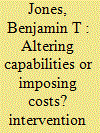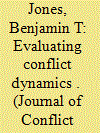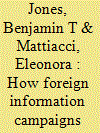|
|
|
Sort Order |
|
|
|
Items / Page
|
|
|
|
|
|
|
| Srl | Item |
| 1 |
ID:
153911


|
|
|
|
|
| Summary/Abstract |
How do military interventions affect the outcome of civil wars? The diversity of military interventions makes it difficult to answer this question; their variation means that they do not affect civil wars in a straightforward way. In particular, strategy and timing play a pivotal role in determining the effect of an intervention. Thus, I isolate three intervention strategies: indirect (bolstering the capabilities of the supported side), direct-conventional (degrading the capabilities of the opposition), and direct-unconventional (imposing costs on the opposition). I evaluate the impact of these strategies on the outcome of civil wars using a dataset of all civil wars from 1944 to 2007. My analysis reveals that the efficacy of intervention strategies varies over time. Third-party support for rebel organizations is most effective during a critical window early in a civil war. In contrast, direct military assistance for the government increases the odds of a government victory only once a civil war becomes protracted. It also reduces the odds of a negotiated outcome to the conflict, whereas indirect support for the government proves most effective early in the war. This work demonstrates that pooling all interventions together risks overlooking important differences in their effects on civil wars. It also carries with it important implications for states considering interventions in civil wars.
|
|
|
|
|
|
|
|
|
|
|
|
|
|
|
|
| 2 |
ID:
168719


|
|
|
|
|
| Summary/Abstract |
The use of duration models in political science continues to grow, more than a decade after Box-Steffensmeier and Jones (2004). However, several common misconceptions about the models still persist. To improve scholars’ use and interpretation of duration models, we point out that they are a type of regression model and therefore follow the same rules as other more commonly used regression models. In this article, we present four maxims as guidelines. We survey the various duration model interpretation strategies and group them into four categories, which is an important organizational exercise that does not appear elsewhere. We then discuss the strengths and weaknesses of these strategies, noting that all are correct from a technical perspective. However, some strategies make more sense than others for nontechnical reasons, which ultimately informs best practices.
|
|
|
|
|
|
|
|
|
|
|
|
|
|
|
|
| 3 |
ID:
159251


|
|
|
|
|
| Summary/Abstract |
Interest in processes has become increasingly pronounced in international conflict research in recent years, especially how these processes unfold across time “dynamics”. We focus in particular on “stage conceptions” of dynamics: processes that unfold over a series of sequential, and possibly recurrent, stages. We suggest that stage conceptions have two key properties: plurisectality and conditional covariate effects. We propose a novel econometric application to quantitatively assess claims regarding stage conceptions of dynamics: survival modeling. Specifically, we use multistate models to examine how a process evolves through its individual stages, and also whether covariate effects differ across these stages. We use Huth and Allee’s territorial dispute data to demonstrate the importance of conceptualizing conflict as a dynamic process, as well as empirically modeling it as such. We show democracy has different effects on dispute resolution, depending on the dispute’s stage, but that these different effects disappear after time passes.
|
|
|
|
|
|
|
|
|
|
|
|
|
|
|
|
| 4 |
ID:
192877


|
|
|
|
|
| Summary/Abstract |
Governments involved in civil wars often seek to shape foreign perceptions of the conflict and of the government’s role in the conflict. To this end, for example, many such governments have engaged in public diplomacy campaigns (PDCs) in the United States since the end of the Cold War. Specifically, these governments have hired US public relations (PR) and lobbying firms to present favorable narratives of themselves and their role in the conflict. Through PDCs, governments seek to shape US public pronouncements about the governments and the conflict itself. Are PDCs effective tools to reach this goal? We argue that the effect of PDCs is divergent. PDCs help mobilize both supporters and opponents of the sponsoring governments. In so doing, PDCs increase both positive and negative public statements from US officials toward the civil war government. We compile data on PDCs in the United States since the end of the Cold War. Our results have implications for research on foreign influence in foreign policy, combatants’ moral hazard, and international norms about combatant behavior. Moreover, in order to gauge the influence of foreign actors on domestic narratives of civil wars, it is crucial to consider how such foreign actors can indirectly shape the discourse around conflict by mobilizing domestic factions.
|
|
|
|
|
|
|
|
|
|
|
|
|
|
|
|
|
|
|
|
|